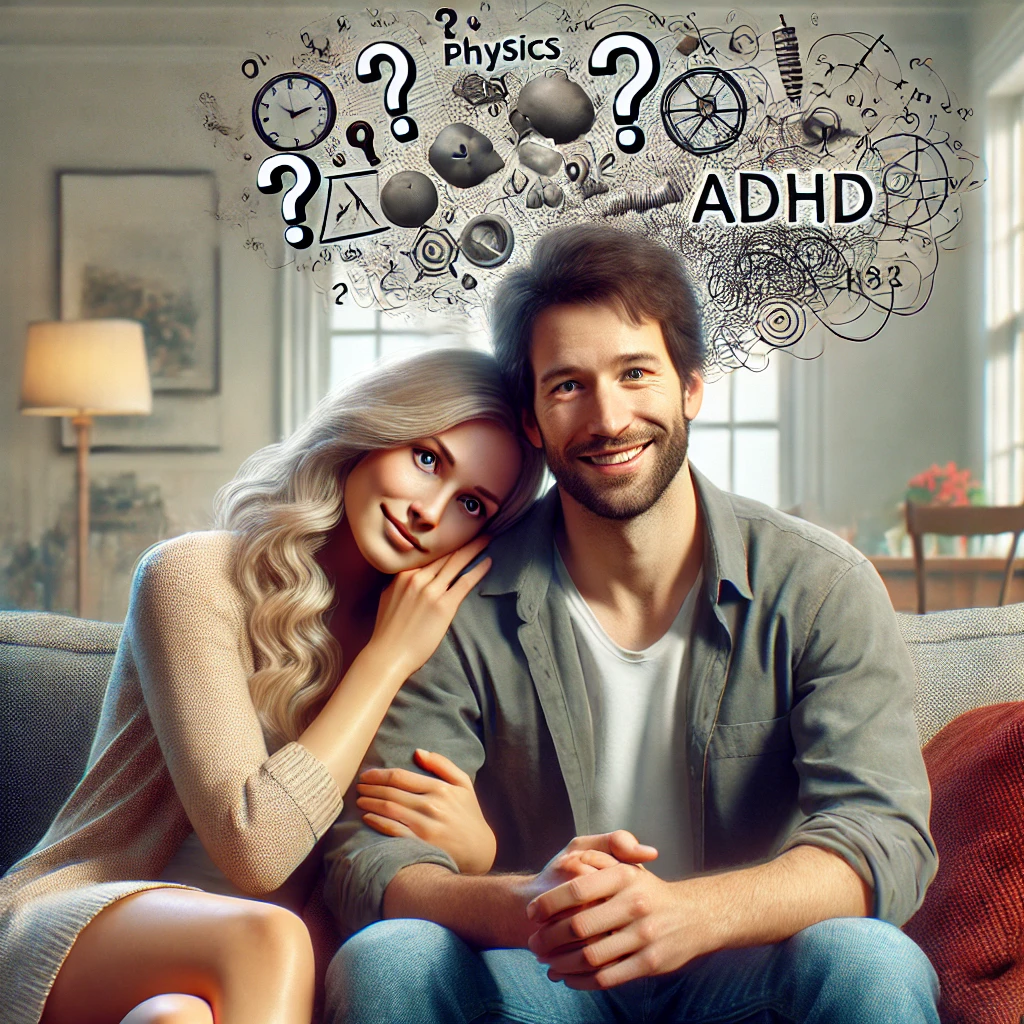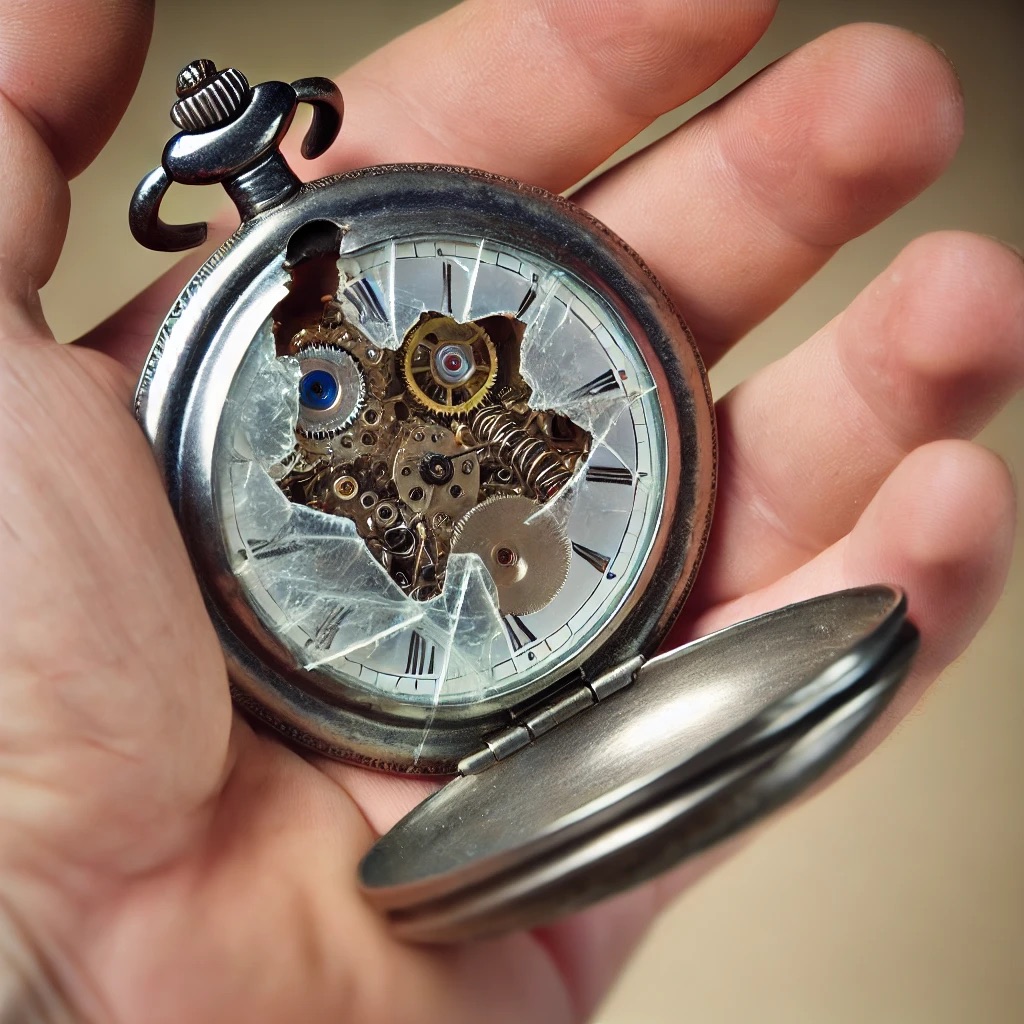
Navigating Marriage When One Partner Has ADHD and the Other Does Not: Challenges and Triumphs
Marriage is a beautiful journey, filled with love, laughter, and shared experiences. But when one partner has Attention Deficit Hyperactivity Disorder (ADHD), it can sometimes feel like you’re navigating a maze blindfolded. My husband (ADHD) and I (Neurotypical and very Type A) are one such couple and learning as we go that you can make it work and even thrive together. That’s not to say that we haven’t had our difficult times or hard seasons though! This article explores the challenges and triumphs of a marriage where one partner is neurotypical, and the other is neurodivergent, specifically focusing on ADHD.
Understanding ADHD in Marriage
First off, let’s get a basic understanding of ADHD. ADHD is a neurodevelopmental disorder that affects attention, impulsivity, and activity levels. It’s important to remember that ADHD manifests differently in everyone, and what works for one person might not work for another. In a marriage where one partner has ADHD and the other does not, misunderstandings are bound to happen. But fear not! With a bit of insight and a lot of love, these can be overcome.
ADHD can impact many aspects of a person’s life, from their ability to manage time effectively to their emotional regulation. It often involves challenges like hyperactivity, impulsivity, and inattention. However, it’s also important to recognize that ADHD can bring positive traits, such as creativity, spontaneity, and an ability to think outside the box. When managed well, these traits can greatly enrich a relationship.
In marriages where one partner has ADHD, the key is understanding how these traits play out in daily life and how they can both challenge and strengthen the relationship.
Common Challenges in Neurotypical-Neurodivergent Marriages
1. Different Perceptions of Time
Misunderstanding: Time management is often a significant challenge for individuals with ADHD. The neurotypical partner might see their ADHD partner as careless or lazy when they consistently run late or procrastinate. This perception can lead to frustration and resentment, especially when it feels like the ADHD partner isn’t taking commitments seriously.
Solution: Implementing visual timers and setting reminders can help manage time more effectively. Agreeing on buffer times for important events can also reduce frustration. For example, if you need to leave the house by 6:00 PM, setting a buffer time of 5:45 PM allows for unexpected delays. Additionally, breaking down tasks into smaller, more manageable chunks with set deadlines can make them feel less overwhelming and more achievable for the ADHD partner.

2. Communication Breakdowns
Misunderstanding: Communication is another area where ADHD can create challenges. The ADHD partner might zone out during conversations, leading the neurotypical partner to feel ignored or unimportant. This can happen not because the ADHD partner doesn’t care, but because they struggle with sustaining attention, especially if the conversation is lengthy or involves complex details.
Solution: Schedule regular check-ins where both partners can discuss important topics without distractions. This might mean setting aside time after dinner when there are no other obligations or turning off the TV and putting away phones during these conversations. Active listening techniques, such as repeating back what was said or summarizing the main points, can also help ensure that both partners feel heard and understood.
3. Differing Organizational Skills
Misunderstanding: The neurotypical partner might feel like they are carrying the bulk of the household responsibilities due to their ADHD partner’s disorganization. This imbalance can lead to feelings of resentment or burnout if one partner feels like they are constantly picking up the slack.
Solution: Creating shared to-do lists and dividing tasks based on each partner’s strengths can balance the workload. For example, the ADHD partner might be great at doing the grocery shopping or taking care of tasks that require creative problem-solving, while the neurotypical partner might excel at maintaining a schedule or keeping the household organized. Consider using apps designed to help with organization, such as Trello or Todoist, which can keep both partners on the same page and make it easier to track shared responsibilities.

4. Impulsivity and Financial Strain
Misunderstanding: Impulsivity is a common trait in people with ADHD, and it can extend to financial decisions. The ADHD partner’s impulsive spending can lead to financial stress, making the neurotypical partner feel insecure about their future. This can cause significant tension in the marriage, especially if it leads to financial instability.
Solution: Setting up joint financial goals and having open discussions about budget limits can mitigate this issue. It’s important to approach these conversations with understanding rather than blame. Automatic savings plans can also help curb impulsive spending by ensuring that money is saved before it can be spent. Additionally, discussing major purchases together and setting a “cooling-off” period before making non-essential purchases can help prevent impulsive decisions.
5. Emotional Dysregulation
Misunderstanding: Emotional dysregulation is another challenge that can arise in marriages where one partner has ADHD. The ADHD partner may have intense emotional reactions, which can be overwhelming for the neurotypical partner. These reactions can include frustration, anger, or even bouts of anxiety, which might seem disproportionate to the situation at hand.
Solution: Learning about emotional triggers and developing coping strategies together can ease these moments. It can be helpful to have a plan in place for when intense emotions arise, such as taking a break, using calming techniques, or talking things through with a therapist. Professional counseling can also provide tools for managing emotions, helping both partners to navigate these situations with more understanding and patience.
6. Memory Issues
Misunderstanding: Memory issues are common in ADHD, and forgetting important dates or tasks can make the neurotypical partner feel undervalued or neglected. This can be particularly painful when it comes to anniversaries, birthdays, or other significant events that the neurotypical partner values.
Solution: Using shared calendars and setting reminders for important dates can help keep both partners on the same page. Technology can be a great ally here—apps like Google Calendar allow for shared event reminders, ensuring that both partners are aware of upcoming events. Celebrating small victories together, such as successfully remembering an important date, can also strengthen the bond and create positive reinforcement for good habits.
7. Different Social Needs
Misunderstanding: Social needs can differ greatly between neurotypical and neurodivergent individuals. The ADHD partner might have a higher need for social interaction or stimulation, while the neurotypical partner might prefer quieter, more structured environments. This difference can lead to conflicts, especially when it comes to planning social activities or spending time together.
Solution: Finding a balance between social activities and downtime is crucial. It’s important to respect each other’s social needs and find a compromise that works for both partners. For example, the couple might agree to attend social events together but also schedule regular quiet evenings at home. Alternatively, they might agree that the ADHD partner can pursue social activities independently when the neurotypical partner needs downtime. Communication and flexibility are key to finding a solution that satisfies both partners.
8. Task Initiation and Completion
Misunderstanding: Starting tasks but not finishing them is a common challenge for people with ADHD. The neurotypical partner might get frustrated when tasks are started but not completed, leading to feelings of disappointment or frustration.
Solution: Breaking tasks into smaller, manageable steps and celebrating each completed step can help. Setting deadlines and using accountability can also motivate completion. For example, the ADHD partner might agree to complete one part of a larger task by a certain date, with the understanding that they will receive positive reinforcement for doing so. This approach not only makes tasks feel more achievable but also helps build a sense of accomplishment and progress.

9. Sensitivity to Criticism
Misunderstanding: Individuals with ADHD might be more sensitive to criticism, which can lead to defensive reactions that escalate conflicts. This sensitivity can make it difficult for the neurotypical partner to express concerns or frustrations without triggering a negative reaction.
Solution: Practicing constructive criticism and focusing on positive reinforcement can foster a more supportive environment. Using “I” statements instead of “you” statements can reduce defensiveness. For example, instead of saying, “You never finish what you start,” the neurotypical partner might say, “I feel stressed when tasks are left unfinished because it makes me feel like we’re not making progress.” This approach focuses on the impact of the behavior rather than assigning blame, making it easier for the ADHD partner to hear and respond to the feedback.
10. Hyperfocus
Misunderstanding: Hyperfocus is a phenomenon where individuals with ADHD become so engrossed in a task or hobby that they neglect other responsibilities or their partner. While hyperfocus can lead to remarkable achievements in specific areas, it can also create a sense of neglect or disconnection in the relationship.
Solution: Setting boundaries around hyperfocus activities and scheduling regular quality time together can ensure that the relationship remains a priority. It’s important for the ADHD partner to recognize when they are entering a state of hyperfocus and to set reminders to take breaks or shift their attention to other important areas of their life. The neurotypical partner can also help by gently reminding their spouse when it’s time to step away and focus on the relationship.

Encouragement for Neurodiverse Marriages
It’s important to remember that every relationship faces challenges, and a neurodiverse marriage is no exception. However, these challenges can also become the very fabric that strengthens your bond. Here are a few reasons to stay encouraged:
Complementary Strengths: Often, the differences that seem to cause friction can actually complement each other beautifully. In many neurotypical-neurodivergent marriages, the unique strengths of each partner can create a balanced and dynamic partnership. For example, while the neurotypical partner might excel in organization and planning, the ADHD partner may bring creativity, spontaneity, and the ability to think outside the box. These complementary strengths can help the couple tackle challenges in innovative ways and approach life with a more balanced perspective.
For instance, if the ADHD partner struggles with planning, the neurotypical partner can step in to provide structure and guidance. Conversely, the ADHD partner might infuse the relationship with energy and new ideas, helping to keep things exciting and preventing the couple from falling into a monotonous routine. By recognizing and valuing each other’s strengths, couples can turn potential points of conflict into opportunities for growth and collaboration.
Growth and Understanding: Navigating ADHD together can lead to deeper understanding and empathy. A neurodiverse marriage requires both partners to communicate openly and honestly, which is the cornerstone of any strong relationship. Through this process, partners can develop a profound understanding of each other’s needs, triggers, and coping mechanisms. This understanding not only strengthens the emotional bond between partners but also equips them with the tools needed to navigate future challenges.
As the neurotypical partner learns more about ADHD and how it affects their spouse, they may become more patient and compassionate in their responses. Similarly, the ADHD partner may gain a greater awareness of how their behaviors impact the relationship and work towards finding strategies to mitigate potential conflicts. This mutual growth fosters a deep sense of connection and trust that can sustain the marriage through difficult times.

Shared Victories: Every time you overcome a challenge together, it becomes a shared victory. These victories build resilience and a sense of teamwork that is incredibly rewarding. Whether it’s finding a solution to a recurring issue, like managing finances, or successfully implementing a new communication strategy, each achievement reinforces the couple’s ability to work together and strengthens their bond.
Celebrating these victories, no matter how small, is crucial. It reinforces positive behaviors and provides both partners with a sense of accomplishment. Over time, these shared successes create a strong foundation of trust and collaboration, making it easier to tackle future challenges. Couples can celebrate these victories in various ways, such as taking a special outing, expressing appreciation, or simply acknowledging the progress made.
Unique Perspectives: The ADHD partner often brings creativity, spontaneity, and energy into the relationship, while the neurotypical partner provides stability and structure. Together, these traits create a dynamic and fulfilling partnership. The neurotypical partner’s ability to provide consistency and predictability can help ground the relationship, while the ADHD partner’s enthusiasm and innovative thinking can keep it vibrant and exciting.
For example, the ADHD partner might come up with a spontaneous idea for a weekend getaway, while the neurotypical partner can handle the logistics of planning and execution. This blend of creativity and organization can lead to rich, memorable experiences that neither partner could create on their own. By embracing and leveraging these unique perspectives, couples can create a marriage that is both stable and full of life.
Patience and Love: At the end of the day, patience and love are the glue that holds your relationship together. Navigating a neurodiverse marriage requires both partners to exercise patience as they learn to understand and accommodate each other’s differences. This patience is born out of love—the deep, enduring affection that motivates each partner to support and uplift the other, even when times are tough.
Celebrating each other’s quirks and learning to navigate the rough patches with grace makes your bond unbreakable. It’s important to remember that all relationships require effort, and the challenges you face together can ultimately bring you closer. By approaching these challenges with a spirit of love and understanding, you can build a marriage that is not only resilient but also deeply fulfilling.

The Role of Professional Support
While many couples can navigate the challenges of ADHD in marriage on their own, professional support can be an invaluable resource.
For those of faith like my husband and I, our Pastor is always going to be our first port of call when outsourcing help just due to our particular values and one that we would highly recommend to others. However couples therapy, especially with a therapist who has experience in neurodiversity, can provide tailored strategies for managing ADHD-related issues. A therapist can help both partners develop better communication skills, understand each other’s needs more deeply, and find practical solutions to everyday challenges.
Additionally, individual therapy for the ADHD partner can be beneficial. It can help them develop coping mechanisms, improve their executive functioning skills, and better manage their symptoms. Therapy can also provide a safe space for the ADHD partner to explore their experiences and feelings, which can lead to greater self-awareness and self-acceptance.
Support groups for neurodiverse couples can also be a great resource. Connecting with others who are in similar situations can provide a sense of community and shared understanding. These groups can offer practical advice, emotional support, and a reminder that you are not alone in your journey.
The Importance of Self-Care
In any marriage, self-care is crucial, but it becomes even more important in a neurodiverse relationship. Both partners need to ensure that they are taking care of their mental, emotional, and physical health. For the neurotypical partner, this might mean finding ways to manage stress, seeking support when needed, and setting healthy boundaries. For the ADHD partner, self-care might involve developing routines that support their well-being, such as regular exercise, mindfulness practices, and ensuring they get enough rest.
It’s also important for both partners to support each other’s self-care practices. This might involve giving each other space when needed, encouraging healthy habits, and checking in regularly about how each person is feeling. By prioritizing self-care, both partners can bring their best selves to the relationship, which ultimately strengthens the marriage.

Misconceptions and Stereotypes
Neurodiverse marriages, particularly those involving ADHD, can sometimes be misunderstood or stereotyped. Common misconceptions include the idea that ADHD partners are irresponsible, that they don’t care about their spouse, or that they are unable to contribute meaningfully to the relationship. These stereotypes can be harmful, as they overlook the strengths and contributions that ADHD partners bring to the marriage.
It’s important to challenge these misconceptions by sharing positive stories and examples of successful neurodiverse marriages. ADHD does not define a person’s ability to love, contribute, or be a good partner. By educating others and promoting a more nuanced understanding of ADHD, couples can help reduce the stigma and create a more supportive environment for neurodiverse relationships.

Aim to Thrive not just Survive
Marriages between neurotypical and neurodiverse individuals, particularly those involving ADHD, are not only possible but can be incredibly fulfilling. It takes effort, understanding, and a lot of communication, but the rewards are worth it. The challenges you face together can become opportunities for growth, deeper understanding, and a stronger bond.
Remember, opposites not only attract; they often complement each other in ways that make the relationship stronger and more vibrant. If you’re in a similar situation, know that you’re not alone. There are resources, communities, and professionals ready to support you. Keep working at it, keep loving each other, and keep celebrating your unique journey together. You’ve got this!
By sharing our personal stories and tips, we can create a supportive community for those navigating the complexities of ADHD in marriage. Every step forward is a step worth celebrating. Here’s to love, understanding, and the beautiful journey ahead!
[ad] Resources
The following are helpful resources on navigating ADHD in relationships and might help to further shed light on any issues or solutions surrounding the ADHD affected-marriage. [ad] Click links below to purchase on the Amazon website:
And then this is NOT a book but it is a fun T-shirt my husband and I enjoy – #iykyk [ad] Click link below to purchase on the Amazon website:
Share your Tips
Feel free to share your experiences, tips, or questions in the comments below and let’s support each other on the journey.






